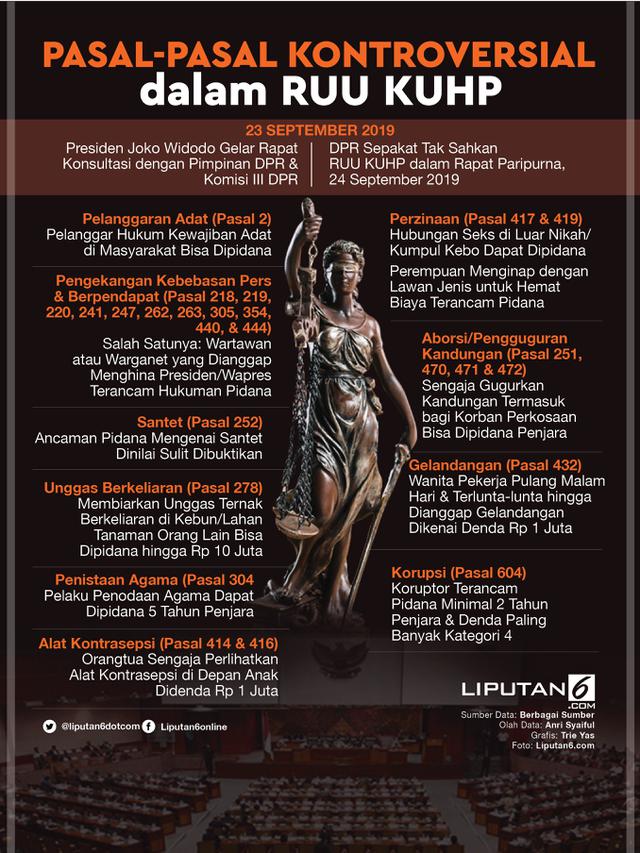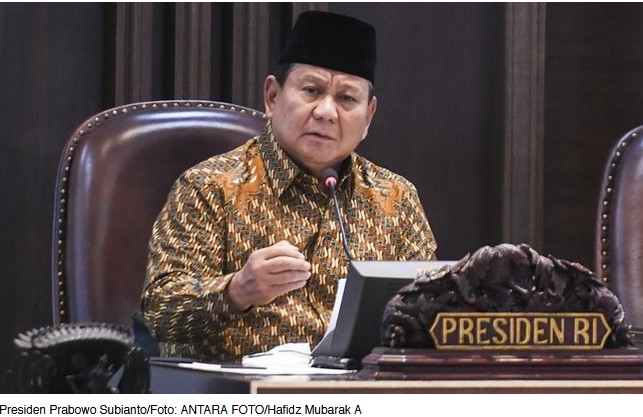
STRATEGIC ASSESSMENT. The House of Representatives on Tuesday enacted the bill on the Criminal Code into law despite mounting public criticisms over its controversial articles, including one that criminalizes sex outside of marriage. Law and Human Rights Minister Yasonna Laoly said the new law will come into force after an introductory period of three years.
Indonesia needs to update the current Criminal Code that has been adopted since the Dutch colonial period back in 1918, he added. The century-old penal code is no longer relevant and behind the times, while the replacement has been designed to be “reformative, progressive, and in accordance with the present situation in Indonesia,” Yasonna said.
The Criminal Code was approved unanimously by all nine parties during a plenary session in the 575-member lower chamber of the country’s legislature. House Deputy Speaker from the Gerindra Party faction Sufmi Dasco Ahmad, who chaired the meeting, made sure that the code’s “crucial” articles had been reformulated in response to feedback from the public.
He said the Draft Criminal Code only needs to be properly disseminated so that it does not cause controversy like it did in 2019. Supporters of the move say revising the code was long overdue, while critics say the provisions themselves risk undermining the country’s efforts to be seen as a moderate Muslim-majority democracy and a destination for global investment.
The recently passed Draft Criminal Code governs criminal threats to defamation of honor and slander. The criminal threat listed in Article 433 paragraph (1) regarding defamation of honor by accusing something is punishable by up to nine months in prison or a category II fine (IDR10,000,000).
In the subsequent paragraph (2), if the perpetrator of defamation of honor does so through writing or pictures displayed or posted in a public place, he will be punished with imprisonment for a maximum of one year and six months, as well as a maximum fine of category III (IDR50,000,000). Article 434 includes the threat of criminal defamation, with a maximum prison sentence of four years or a maximum fine of category IV (IDR200,000,000).
National Resilience Institute (Lemhannas) Governor Andi Widjajanto said the new Criminal Code was a progressive step. He specifically mentioned private matters, in which the state cannot now intervene. In the article on extramarital sex, for example, he said that in the past, the state could intervene in criminal offenses.
But now, anyone may bring an unmarried partner to live with them as long as there are no complaints from the family. According to Andi Widjajanto of the ASEAN Secretariat, the new Criminal Code is Indonesia’s attempt to have a national criminal law that is not inherited from colonialism.
Responding to Ambassador Kim’s statement related to the criminal code, Acting Director General of Law and Human Rights Dhahana Putra said it is not true to say that the articles in the new criminal code affect private lives and have the potential to drive away foreign investors and tourists.
The criminalization of adultery and cohabitation is designed to respect the institution of marriage, as stated in Law No. 1/1974, Dhanana said, while at the same time protecting the public’s private space as stipulated in Article 284 of the Criminal Code concerning adultery, which is still valid today.
The form of protection of the public’s private space is by regulating the two types of offenses as complaint offenses. This means that there would be no legal process unless someone complains legally because they are directly harmed.
Indonesian Ulema Council (MUI) Deputy Chair Anwar Abbas on Wednesday strongly reacted to U.S. Ambassador Sung Y. Kim’s statement that the new Criminal Code could harm Indonesia’s investment climate and urged Indonesia to respect LGBT people. He said that if the United States continues to impose its attitude and views in this manner, Indonesia must, in the words of the first president Soekarno, “go to hell with your aid and investment!”
He said the U.S. Ambassador’s statement was very tendentious and had a threatening tone because it appeared that the U.S. government wanted to force and urge Indonesians to tolerate LGBT acts and cohabitation. If the Indonesian government does not adopt these attitudes and viewpoints, the United States will not invest in the country, he said. He regretted the U.S. government’s stance on the new Criminal Code, adding the U.S. government should have respected Indonesia’s religious and cultural traditions.
Responding to Ambassador Kim’s criticism of the article prohibiting cohabitation, Indonesian Ulema Council (MUI) Center for Da’wah and Brotherhood Affairs Chair Cholil Nafis on Wednesday said on his Twitter account that the U.S. Ambassador had interfered with Indonesia’s sovereignty over its values.
He said the United States should not compare its values with the principles of Pancasila, saying he believed that cohabitation and LGBT persons are more dangerous than the risks of losing foreign investment.
House member from Golkar Party faction Nusron Wahid on Wednesday expressed regret that U.S. Ambassador to Indonesia Sung Y. Kim commented on the Criminal Code that Indonesia had just passed, particularly the article regarding the threat on adultery.
He said the U.S. Ambassador should not interfere with Indonesia’s political product and link it to the investment climate, He said Indonesia requires investment and tourism, but that does not mean it has to jeopardize the moral principles of its people.








